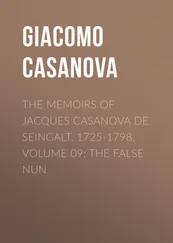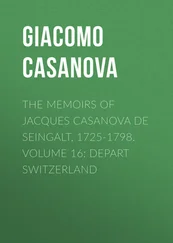T he women backed away toward the wall and the door. The man turned his tousled head to one side, blinked — there were traces of down from the pillow in his hair, and he looked as if he had come fresh from a masked ball or some underworld carnival of dreams where he had danced like a dervish until witches had tarred and feathered him — then ran his piercing glance over the room and the furniture, turning his head this way and that at leisure as if he had all the time in the world, as if he knew that everything was of equal importance, because it is only the feelings we have about what we see that makes things seem different. At this point he noticed the women and rubbed his glazed, half-closed eyes. He stood for a moment like that, with his eyes closed. Then, his head still tilted to one side, he surveyed them in a proud, inquisitorial manner, the way a master looks at his servants, a real master, that is, who does not regard his servants as peculiarly fallible people just because he is the master and they his servants, but as people who have willingly undertaken their roles as servants. Now he raised his head and seemed to grow a little. He drew his gown over his left shoulder with a rough movement of his short arms and bony yellow hands. It was a grand, theatrical gesture. The women sensed this and it was as if they were released from the spell that had first bound them, for, with this movement, the man showed that he was not as certain of himself as he first seemed, that he was merely strutting and miming the actions of the privileged and powerful: and so they relaxed and started coughing and clearing their throats. But no one said anything. They stood like that a long time, silent, unmoving, locking eyes with him.
But now the man laughed, as easily as he might sneeze, with no intervening change of mood. He laughed silently, more with his eyes than his mouth, his eyes opening wide and filling with light: it was like a sudden opening of windows in a dark room. This light, which was good-humored, crude, blinding, and impudent, inquisitive yet confidential, touched the women. The women themselves did not laugh: they did not cry “Aha!” or exclaim “Oho!” or giggle “Tee-hee.” They listened carefully and watched him. Lucia turned her eyes away a little, looked up at the ceiling as if expecting help from there, and silently, under her breath, groaned, “Mamma mia!” Nanette wrung her hands in an attitude somewhat like prayer. The man, too, kept silent and continued laughing. Now he showed his teeth, yellowing, slightly splayed, part of a large and powerful structure like an undamaged, predatory set of tusks, and his eyes, mouth, teeth, and the whole face laughed silently, with a lazy, comfortable, self-conscious good humor, as if there could be nothing finer or more amusing than this scene, here, in Bolzano, in a room of The Stag, around noon, facing a bunch of startled women who had sneaked in to watch him wake in order that they could gossip about him later in the town and around the local wells. The laughter shook his upper torso. He put his hands on his hips and leaned back gently so as to laugh better. It was as if a feeling that had long been trapped within his body had broken into pieces and was now coursing through him in hot currents, a feeling that was neither deep, nor high, nor tragic, but simply hot and pleasant, like the sense of being alive: so the laughter slowly began to bubble up his throat, found voice, cracked as it stumbled forth, then suddenly flooded out of him the way a crude, popular song might flow from the mouth of a singer. And within a few seconds, his hands still on his hips, he was bent backward and laughing out loud.
This laughter, a volley of uproarious, all-compassing, tear-wrenching, side-splitting power, filled the room and was audible down the corridor, even across the square. He was laughing as if something had just occurred to him, as if he had understood what had happened, as if the range and depth of human treachery, which was indeed infinite, had irritated him to laughter. He laughed like someone who, having woken from a nightmare, remembered where he was, saw things clearly, and would not be satisfied with mere shadows of whatever he found fearful and laughable. He laughed as though he were preparing for something, some enormous practical joke that would dazzle the world; he laughed like an adolescent, in full throat, with an oddly wolfish howl, as if he were about to sprinkle itching powder on a woman’s bodice, or on the nightshirts of the great, the powerful, and the grand; he laughed as if he were set to execute a marvelous, earth-shaking caper; as if, out of sheer good humor, he were to blow earth itself to smithereens. Both hands on his hips, his belly shaking, his chest protruding, his head cocked to one side, he laughed a hoarse, long, twitching laugh. The laughter choked, then turned to coughing, for he had developed a chill during his travels, and the altitude — the air of the mountains combined with the effects of the November weather — was hard on his constitution. His face grew contorted and flushed.
When the spasm was over, his sense of humor seemed to desert him and a terrible fury took hold of him. “I see I have lady visitors,” he muttered through clenched teeth, his voice cracked and sibilant. He crossed his arms across his chest. “What a privilege, dear ladies!” He bowed deeply, ornately, disposing both hands and legs in a parody of courtesy, as if he were in a corridor at Versailles, greeting ladies of the French court on a fine morning, while the king, plump-bellied and purple-faced, was still fast asleep, or as if he were idling away his time with flâneurs and toadies, practicing manners with them. “What a privilege,” he repeated, “for a gentleman of the road like myself! For a fugitive who has only just escaped the hell of a damp, rat-infested prison, having seen not one friendly face nor met a single expression of tenderness in over a year and a half! What honor, and what privilege!” he mocked and minced in a somewhat threatening way. The women felt the threat in his voice, drew closer together like hens in a storm, and slowly backed away toward the door, Lucia using the lower half of her body to feel her way along the wall. The man took slow deliberate steps toward them, pausing at every stride. “To what do I owe the good fortune,” he began, then continued in a cracked but louder voice. “To what do I owe the good fortune of discovering the assembled beauties of Bolzano crowded in my room as I wake? What has prevailed upon the ladies of Bolzano to visit the fugitive, the exile, the man rejected by the rest of society, who is even now pursued by police dogs and wolf packs over borders, whose trail the mercenaries of the Holy Inquisition are trying to follow through bushes and across forest floors with pikes and lances in their hands? Are the ladies not afraid that they come upon the poor fugitive in one of his less charitable moods, at this precise time, the morning after he has spent his first night in a bed fit for human occupation, not on straw that smells of incontinent dogs? Are they not afraid of him now that he has woken and begun to remember? What do the beauties of Bolzano desire of me?” he asked, by now at full volume, his voice breaking with fury. He straightened up in a single violent movement and it was as if, for a moment, he had grown more handsome. His face was bright with anger, like a bare landscape lit by lightning. “Who, after all, am I that the ladies of Bolzano should steal into my room when I have come to claim rights of hospitality in the temporary lodging of the homeless?” It was clear to see that he was enjoying the effects of his speech, the panic it wrought in the women and the advantage it gave him in the situation. His confidence was growing: by now he was playing with them the way a swordsman plays with a lesser opponent, coming closer with every step, his every word like a swish of the blade. “Beauties of Bolzano! You, the haughty brunette, yes you! You, with your virtuous looks and the rosary beads over your cloak! You, with the ample bosom there in the corner! And you, old lady! What are you all looking at with such curiosity? A fire-eater or sword swallower might have arrived in town to demand your attention, but here you are, sneaking about, gaping at a poor feral creature like me! This is not a cage in a traveling circus, ladies. The feral creature is awake and hungry!”
Читать дальше












